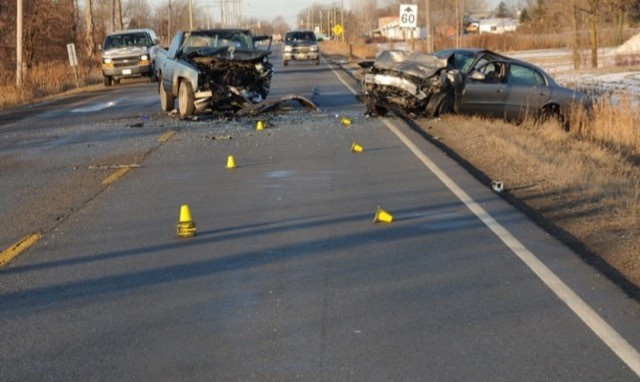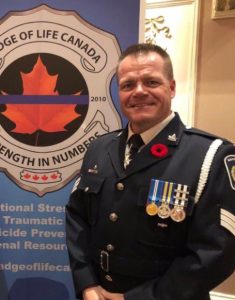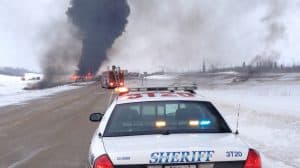Growing up I wasn’t always the fastest, smartest, or strongest, and failed at many things, but before I lost my father to cancer when I was 16, he left me with two lessons that have guided my personal ethos; “you can accomplish anything that you put your mind to”, and “if something is worth doing, then it is worth doing right the first time, but if you don’t succeed, try again”. From a young age my teachers, coaches and friends described me as persistent, always the “Most Improved Player”, it drove me to persevere through sports, school, work, and life. I was raised in the Catholic Church, and from a young age I understood the virtues of compassion, empathy, and the importance of giving back to my community. However, in 1988 when I held my father’s hand and watched him take his last breath, this became the foundation of my trauma, and the greatest influence on my OSI road trip. Within a year of my father’s death, I experienced the passing of my grandmother and the sudden tragic loss of my soccer team captain to an impaired driver. I withdrew from my church, went into self-preservation mode, and only began to look out for #1. By 18, I was on my own making my way in life. An accomplished soccer player and aspiring physical education teacher, I ventured away to university in 1991. As with many, I drank away my first year, returned to my hometown to live with a friend for a couple years and got my life back on track. In 1994 I returned to university and two life changing events occurred; I started what has become a lifelong volunteer career with St. John Ambulance, through whom I have learned a great deal about servant leadership, and most importantly, I started dating Lisa, my best friend, soul mate, and my “Tiny Angel”. I finally completed my Physical Education degree in 1997 and made the decision to take a road trip into the world of law enforcement.
The issues of first responder mental health and suicide are at the forefront of today’s media, but in 1998 they were taboo to speak about. I did not realize it then, but I was bringing my prior traumatic life events, that I had not dealt with, into a highly vulnerable career. Like every young police officer working the frontline, I had my share of exposures to critical and traumatic events; two motor vehicle collisions during my first month on the job (I was passenger in both) and a 6 month old infant death (who was only 3 days older than my daughter) to name a couple. For the most part I chalked them up to being part of the job, just sucked it up, and didn’t talk about them. This is the moment I started self-medicating, ceased working out, and began to avoid my young family.
In January 2004 I transferred to Traffic Services, where I have spent the rest of my career, with the exception of an 11 month posting as a uniform patrol supervisor. The first four years I served as a Traffic Enforcement Officer through a period of organizational dysfunction, chaos, and restructuring, and hit another speed bump in my OSI road trip; suffering a lost time duty injury after an accused tried to disarm me while conducting a breath test. I knew I should have pulled over and gotten off the road, literally and figuratively, but just kept going.
From 2007 till my promotion in 2017, I had left the frontline and took a detour into the detective office as full-time collision investigator, where I amassed nearly 600 collision investigations over the course of my career. This was without question the most rewarding job I have had in my policing career, because I was getting families answers about their loved ones in the most traumatic times of their lives, because no one can prepare for that knock at the door.
On April 3rd, 2015, for the first time, I had a collision investigation that touched close to home, a life-altering fail-to-remain investigation in which both victims were known to my children. This affected me greatly, but I felt like I needed to “be strong” for both my family and the victims. This was a major fork in the road for me, and I never stopped to evaluate which route was the best. I needed to take action for my wellness and mental health but didn’t, and this is where I really lost control of my journey. 2015 was the year I had been on-call for over 28 weeks and attended 76% of the unit’s collision investigations.
I was cautiously optimistic about 2016 because in my mind it was a milestone anniversary for my father’s death. Sadly, that spring brought the passing of my mother-in-law, which brought up a lot of oppressed memories of my father; anger, sadness, guilt, etc… all emotions that I professed to have dealt with, but found out how wrong I was. Within a week of mother-in-laws passing I found myself at a fiery single motor vehicle collision, in which I pulled a former university teammates charred and partially cremated body out of his motor vehicle. It was a collision that I never should been at, but was “ordered” to stay. Adding to these traumas were my ancillary duties as the Provincial Reconstruction Committee Chair, Team Leader, Unit Training Officer (training three new members at the same time), and I was competing in the ever stressful promotional process.
Then came Wednesday, July 20th, 2016; after having worked 22 hours the day before, my body decided it had enough and it “turned the engine off” on me, and I crashed head-on into a brick wall. The trigger was a simple email about a procedural change, which no longer permitted me to perform certain administrative duties that I had been doing for the past nine years. July 20th is a blur to me; I have pockets of memory loss that I have been able to piece together, ironically through social media. I remember being very angry and deciding to go for a bike ride, but do not remember the ride, and only know where I went because my Garmin tracked it. 50 kilometres later, I found myself sitting on the side of the road crying at the same spot where a cyclist had died in the collision I had investigated the day before. I do not remember riding home, or taking the Police vehicle back to the office, but I do remember picking up my truck and planning on meeting with an old friend about an hour’s drive west. The next thing I remember is getting off the highway about 2 hours east of where I had intended. Wrong turn or right turn, I do not know, but I stopped at my old soccer field and took a picture, posting it online, but the location tag said I was in Darlington, Pennsylvania. This proved to be a good a thing, because it raised concerns for my wife, and Lisa called me asking where I was and what was going on. By that point I had continued driving further east and was sitting in front of my best friends grave stone crying. Again, if it wasn’t for the picture and Lisa telling me about our conversation, I would not have knowledge of this. I do remember meeting my brother for a bite and a beer, and visiting our father’s grave where we cried together for a good long time. The two and half hour drive home is a blur, and Lisa tells me that when I got home I cried for hours, crying myself to sleep.
In the immediate aftermath, Lisa reached out to her employee and family assistance plan because I did not want to call mine for fear it would affect my promotional chances. I met with a psychotherapist, but the next couple days didn’t get any better, with increasing anxiety and panic attacks, uncontrollable crying, and little to no sleep. My family doctor was unavailable for at least a week, and I knew I could not go to the hospital as they would notify my Police service and take my firearm away. Exhausted, scared, and not having a member wellness program in place at work, or any type of guidance as to what was happening to me, I made a “cold call” to BADGE OF LIFE CANADA. The executive director, Bill Rusk called me back almost immediately, spending nearly three hours on the phone, helping me normalizing my experience, sharing his journey, and providing me with the professional resources to get help. The next few weeks got a lot worse, with periods of blurred vision, temporary blindness, constipation, bloodied incontinency, searing headaches, ringing in my ears, tooth pain, and only one to two hours of sleep a night. I went to my family doctor, chiropractor, optometrist, and dentist, even had an MRI, but nothing was “physically” wrong with me. They all told me I as “healthy”. I finally got into see a psychologist, and at first I was so lost and all over the road map during my appointments. The psychologist actually thought I might be suffering from survivor’s guilt over my father. I must admit at that point I thought the psychologist was really a “quack”, and had no clue what she was talking about because, like most men, I wasn’t stopping to ask for directions or for clarity on my father’s death. In my mind I had made my peace with his death, so what she said made no sense to me. I already knew why my father had died, he had fought an eight year battle with brain cancer, he was not taken tragically, nor was my life ever in jeopardy, and it had happened 28 years earlier. I was just looking for a map so I could figure my own way back to where I was going. So began my journey back, not to the main road, but to an alternate route, one of adaptive functioning, positive growth and my “new normal”.
After nearly three months away from work, and against my psychologist’s recommendation, I attempted to return to light duties. This was short lived and a scenario which played out two more times before I finally returned to full-time duties in March 2017. In collision reconstruction we refer to these as secondary and tertiary contacts, but the setbacks I faced over the next three months had nothing to do with critical or traumatic events. They fell into two areas of critical incident stress management; sanctuary trauma and perceived injustice. We are supposed to feel safe at work, protected and supported, but when we are treated as a number, accused of untruths and ostracized, we start to perceive the unjust and our work sanctuary no longer becomes a safe place.
In April 2017, I got promoted and transferred out of Traffic Services into my new role as a frontline supervisor. I still had a lot of work ahead in my recovery but I was just happy my world had final stopped spinning out of control, and the road ahead looked straighter and brighter.
Collision reconstruction is about putting the whole collision back together to find out what, how and why it happened. In order to do that for my OSI road trip, I had to find what was going to work for me. I tried several recommended self care activities which did not work; peer group counselling proved toxic and left me crying all the way home, and meditation is good but not for an impatient person. Learning to breathe properly and to become mindful of the here and now were useful tools, and journaling proved to be invaluable for the release of my emotions and providing a great amount of information for self reflection. My addictive, type ‘A’ personality kicked in and my obsession for learning “everything” about a subject took over, so I started educating myself about what was happening to me and the differences between post traumatic stress, critical incident stress, operational stress, etc… This became a form of cathartic rehabilitation, and kept my mind busy which was both good and bad. Some days it emptied my tank and other days it filled it up. My solace was transitioning from the soccer field after nearly 35 years of involvement, back onto the bicycle, ironically a Scott “Solace” road bike. It helped create balance between my body and mind throughout my return trip to adaptive functioning. Having a goal to join the Police Memorial Ride to Remember every September, a five day, 700 kilometre bicycle journey that required me to train regularly and for long periods at time. This transitioned me away from appointments with the psychologist, to CYCology appointments with Mother Nature, and is now my “go to” therapy when I need to decompress from a stressful day or refuel my resilience tank. Like preventative maintenance on your car, or a check up with your dentist, I still check in with psychologist every six to eight months!
Since my OSI road trip, I have upgraded to a more fuel efficient and environmentally friendly version of myself. I have logged over 33,000 Kilometres on my bicycle, dropped 30 lbs, and now use my renewed love of cycling to keep the conversation about mental health, wellness, and resilience rolling with the wheels of my bicycle. I’ve learned a few lessons along my OSI road trip; 1) it is not about winning or losing, you either succeed or you learn, and you cannot succeed without first learning. 2) You must learn your strengths and limitation before you can help others. 3) Knowledge is not power, the power comes from sharing your knowledge with others and helping them to better themselves. I occasionally still take the main road home, but more often I find myself using the less busy, more scenic alternate routes, because I have learned that life is not about any one single road trip, it is about enjoying the whole journey.
My next road trip is with resilience, I am currently the Coach for my service’s Cops for Cancer Team, and Team Captain for their Ride to Remember Team. In 2019 I rode in the Big Move Cancer Ride and participated in the inaugural Peloton Ride for “mental health and suicide awareness” with two dozen of my LEO colleagues from around the province in support of BADGE OF LIFE CANADA. In 2020 I will be riding with Team B1UE in the 3-Day Wounded Warriors Canada Highway of Heroes Ride “in support of those living with OSI and PTSD”. I am working hard to help make a culture shift across the first responder community. My Police Service now has a Member Wellness Program, and I am proud to be part of both their Critical Incident Response and Peer Support Teams. I am now a Mental Health and Wellness Master-Instructor for ST. JOHN AMBULANCE, working towards my Mental Health First Aid and Law Enforcement First Aid Instructor status, and just finished a review and revision of the Ontario Critical Incident Awareness Program for their frontline volunteers. I am a part of the INTERNATIONAL CRITICAL INCIDENT STRESS FOUNDATION’s Approved Instructor Program cadre, and continue to educate myself in the field of CISM and Peer Support. My destination is unknown, but the mission is simple: share my knowledge, pay forward my experience, and help educate my colleagues about resilience so they can have a safe work ~ life journey, without experiencing any collisions along their road trips.


